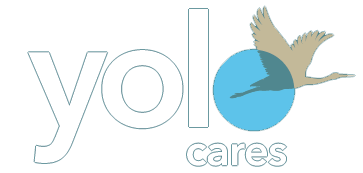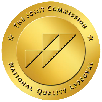What it takes to be in the top 1%
By: Craig Dresang, CEO, YoloCares
Davis and Sacramento are now home to one of the highest quality end-of-life care providers, and employers, in the nation.
In August, The Centers for Medicare & Medicaid Services (CMS), released their quarterly quality-of-patient-care scores, clearly showing that YoloCares sits in the top one percent across California, and in the top one percent of all 6,957 hospice providers in the country. For the past 10 years, the quality of care at the Davis-based organization has shown slow but relentlessly steady improvement toward more perfect care for its patients and families.
CMS has long used a star rating system for both nonprofit and for-profit providers to help healthcare consumers quickly and easily assess an organization’s quality of care. The hospice program at YoloCares is now ranked as a four-star provider. Out of 2,221 hospice agencies in California, only 64 are reported to be at or better than four-stars.
Hospice quality scores are determined using data from claims and patient assessment tools, like the Hospice Care Index (HCI), which assesses performance on 10 indicators to generate a score from 0 to 10. This particular tool consistently ranks YoloCares at 10 out of 10, setting the agency apart from dozens of competitors. In addition, a survey known as the Consumer Assessment of Healthcare Providers and Systems (CAHPS) collects and measures data related to every aspect of patient care. The survey represents a national set of standardized questions, inviting patients and consumers to report their experiences with healthcare services including hospitals, health plans, and an array of providers. It gathers feedback on aspects of care that are important to patients such as communication, coordination of care, ability to manage pain and symptoms, and the alignment of patient values with the care received. The primary purpose of the CAHPS survey is to measure quality, drive improvements in the delivery of care, support informed choices for consumers, and hold providers accountable.
According to Stephanie Baxter, chief clinical officer (CCO) at YoloCares, “We drive quality by consistently putting ourselves in the patient’s or family’s shoes. We must understand what quality looks like from their perspective.” Baxter, one of the few CCO’s in the industry who frequently takes a caseload and provides direct patient care herself, is a rare breed in the hospice world. “I’ve always believed that clinical leaders cannot make sound care decisions unless they are experiencing the delivery of care for themselves,” she says. “Making a decision from behind a desk, in isolation, is very different than making a decision after regularly spending time with patients.”
Another factor that allows the agency’s care to stand out is related to its model of being available 24/7, 365 days a year. “It is very easy for our patients to connect with a clinician,” says Donna Feeney, director of quality, compliance and education. By design, YoloCares strives to remove any communication barriers that could exist between clinical staff and their patients. “In the CAHPS survey question that asks families if the patient received enough help with managing pain and symptoms, our scores are routinely above State and national averages. That’s because we are responsive and timely in getting patients the help they need. Our staff is good about checking in, and communicating, with the patient and family,” according to Feeney.
Years ago, YoloCares developed, implemented and trademarked its own patient-visit model which has been attributed to its exceptional quality. Called “The Perfect Visit,” every staff member (even nonclinical staff) are required to complete “The Perfect Visit” training and certification upon hire and then annually. Even the employees who answer phones, work in the finance department, or in information technology, are mandated to complete “The Perfect Visit” training and certification each year. Feeney explains, “Exceptional care is our product, and every employee at every level needs to understand the basics of our care model. It is what we do.”
Feeney, a former Sutter Health manager of quality and patient safety, says, “Sutter taught me that listening and learning is an important part of driving quality. However, as a former business owner, I also understand that everything matters to the customer or patient.”
Baxter agrees, “There is a connection between our quality of care and our investment in clinicians. We provide excellent ongoing education, and we insist on collaboration between and across departments. Every employee, regardless of their job, is here to serve the patient and family. We make that clear at every level.” Beyond that, Baxter says, “Good leadership makes all the difference. Leaders here are expected to lead by example. We are all students and all teachers.”
The CAHPS survey has a question that asks, “Would you recommend this hospice?” Feeney says, “YoloCares has the highest score possible. That does not mean we are flawless or that we do not have occasional issues, but our attempt to identify and resolve issues is both timely and effective.”
Quality of patient care is not the only area that is routinely surveyed and measured at YoloCares. This year, for the fifth time, YoloCares was nationally ranked as a “Best Place to Work” by the highly regarded Modern Healthcare Survey. This employee engagement survey measures the quality and consistency of organizational culture, staff benefits, and employee satisfaction. Out of 152 companies awarded, only seven are from the Golden State and just three are from Northern California.
Modern Healthcare uses a weighted methodology, relying on a two-part assessment to determine
winners. The rankings are determined largely by employee surveys. The vast majority (80%) of a company’s score is based on anonymous feedback directly from its employees. This gives significant weight to the actual employee experience. The remaining 20 percent of a company’s score is based on an evaluation of organizational policies, practices, benefits, and demographics.
Modern Healthcare partners with the Workforce Research Group to conduct the assessment and select winners. The use of a neutral third party for the evaluation process helps ensure objectivity. Only seven California companies or organizations were selected as “Best Places to Work” for 2025. No other providers in YoloCares’ six-county service area were named.
Just as the agency surveys its patients and families, it frequently engages in staff feedback sessions and surveys to pinpoint needs and opportunities for continuous improvement. “The connection between an empowered and happy staff and outstanding care cannot be underestimated,” according to Feeney.





Leave a Reply